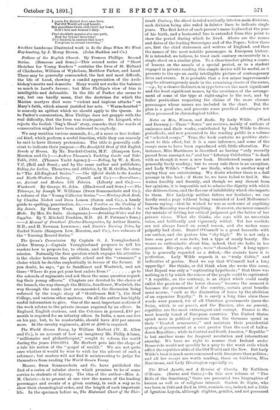Notes on Men, Women, and Books. By Lady Wilde. (Ward
and Downey.)—These " Notes" are reviews, mainly of authors of eminence and their works, contributed by Lady Wilde to divers periodicals, and now presented to the reading public in a volume of " selected essays." True, the book contains no positive state- ment to this effect, but it is a sure inference, and some of the essays seem to have been reproduced with little alteration. For instance, Miss Martineau is described as having "only recently passed from amongst us," and her " Literary Celebrities " is dealt with as though it were a new book. Disinterred essays are not generally lively reading ; but to every rule there is an exception, and Lady Wilde's " Notes " are lively, which is another way of saying they are entertaining. We doubt whether there is a dull passage in the book ; if there be, we have failed to find it. She writes forcibly and fluently, and though we may dissent from her opinions, it is impossible not to admire the dignity with which she delivers them, and the flavour of infallibility which she imparts to them. Her Ladyship neither falters nor hesitates ; we can hardly read a. page without being reminded of Lord Melbourne's famous saying,—that ho wished he was as cock-sure of anything as Tom Macaulay was of everything. Moreover, she never commits the mistake of letting her critical judgment get the better of her private views. What she thinks, she says with no uncertain voice, and brilliantly and vigorously withal. Yet her verdicts are not always based on sound reason, and she makes some palpably bad shots. Daniel O'Connell is a great favourite with our author, and she praises him " sky-high." He is not only a hero sans peur of sans tache, but a type of manly beauty. She waxes so enthusiastic about him, indeed, that she halts in her grammar. His eyes, she says, were " chameleon." A long upper- lip is generally regarded as a defect,—the sintiadx have it in perfection. Lady Wilde regards it as " truly Celtic," and indicative of genius. Need we say that O'Connell had a long upper-lip ? She thinks, or did think when she wrote this essay, that Repeal was only a " captivating hypothesis ; " that there was nothing in it by which the senses of the people could be captivated. " A republic, on the contrary, is an object which could easily enlist the passions of the lower classes," because the moment it becomes the government of the country, certain great benefits must accrue, "such as the diminution of taxes by the abolition of an expensive Royalty." It is surely a long time since these words were penned, for of all Christian governments (save the Swiss, which is sui generis, and the Russian, also sui generis), republics are the most extravagant and corrupt. Franco is the most heavily taxed of European countries. The United States spend more in political pensions than the Germans spend on their " bloated armaments," and maintain their presidential system of government at a cost greater than the cost of half-a- dozen Royalties ; while in Central and South America, " Republic " is but another name for frequent revolution and intermittent anarchy. We have no right to assume that Ireland under Home-rule would not speedily be a prey to the worst evils which afflict the republics alike of the Old World and the New. But Lady Wilde's book is much more concerned with literature than politics ; and all her essays are worth reading, those on Calderon, Miss Martineau, and Lady Blessington especially so.


































 Previous page
Previous page